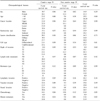Abstract
Purpose
This study was conducted to evaluate the survival differences between curative stage IV and non-curative stage IV gastric cancers after gastrectomy.
Methods
Stage IV gastric cancer patients who received gastrectomy were selected from our surgical data-base from 1995 to 2004. These patients were separated into two groups according to the curability by surgery. We analyzed the survival differences between curative stage IV patients and non-curative stage IV patients. Survival analysis was performed by Kaplan-Meier survival analysis.
Results
During a 10-year period, gastrectomy was performed in 2,214 patients. 224 patients were diagnosed as stage IV. 144 patients were male and 80 patients were female. 97 patients received total gastrectomy. 127 patients received subtotal gastrectomy. 173 patients were diagnosed with curative stage IV and 51 patients were non-curative stage IV. Overall 3-year and 5-year survival rates of stage IV gastric cancer patients in this study were 31.5% and 18.4%. 3-YSR of curative and non-curative stage IV were 36.0% and 16.7% respectively (P-value=0.0204). 5-YSR of curative and non-curative stage IV was 21.9% and 4.2% (P-value=0.0169).
Conclusion
Significant survival differences were found between curative and non-curative stage IV. Although direct tumor extension or distant metastasis exists, gastrectomy with combined resection was important to improve prognosis if it is possible to resect. When it comes to the matter of survival rate, the subclassification of stage IV gastric cancer should be considered for further management.
Figures and Tables
References
1. Kim YS, Kim SS, Min YD. Clinical features of patients with stage IV gastric cancer. J Korean Gastric Cancer Assoc. 2008. 8:91–96.
2. An JY, Ha TK, Noh JH, Sohn TS, Kim S. Proposal to subclassify stage IV gastric cancer into IVA, IVB, and IVM. Arch Surg. 2009. 144:38–45.
3. Park JM, Park SS, Mok YJ, Kim CS. pN3M0 gastric cancer: the category that allows the sub-classification of stage-IV gastric cancer (IVa and IVb). Ann Surg Oncol. 2007. 14:2535–2542.
4. Choi SB, Hong KD, Cho JS, Kim JH, Park SS, Min BW, et al. Prognostic factors of resected stage IV gastric cancer patients. J Korean Gastric Cancer Assoc. 2006. 6:18–24.
5. Ha TK, Kwon SJ. Subclassification of stage IV gastric cancer according to the presence of distant metastasis (IVa and IVb). J Korean Gastric Cancer Assoc. 2006. 6:173–180.
6. Park JM, Kim YH. Current approaches to gastric cancer in Korea. Gastrointest Cancer Res. 2008. 2:137–144.
7. Park CH, Song KY, Kim SN. Treatment results for gastric cancer surgery: 12 years' experience at a single institute in Korea. Eur J Surg Oncol. 2008. 34:36–41.
8. Kim JP. Surgical results in gastric cancer. Semin Surg Oncol. 1999. 17:132–138.
9. Park JM, Ryu WS, Kim JH, Park SS, Kim SJ, Kim CS, et al. Prognostic factors for advanced gastric cancer: stage-stratified analysis of patients who underwent curative resection. Cancer Res Treat. 2006. 38:13–18.
10. Park JI, Jin SH, Bang HY, Paik NS, Moon NM, Lee JI. Survival rates after operation for gastric cancer: fifteen-year experience at a Korea Cancer Center Hospital. J Korean Gastric Cancer Assoc. 2008. 8:9–19.
11. Li C, Yan M, Chen J, Xiang M, Zhu ZG, Lin YZ. Prognostic influence of sub-stages according to pTNM categories in patients with stage IV gastric cancer. J Surg Oncol. 2009. 99:324–328.
12. Ajisaka H, Miwa K. Subclassification of stage IV gastric cancer. Nippon Shokakibyo Gakkai Zasshi. 2008. 105:361–366.
13. Japanese Gastric Cancer Association. Japanese Classification of Gastric Carcinoma. 1998. 13th ed. Tokyo: Kanehara & Co. Ltd..
14. Kwon SJ. Investigation of long-term survivors with stage IV gastric cancer. J Korean Gastric Cancer Assoc. 2002. 2:157–162.
15. Ikeguchi M, Oka S, Gomyo Y, Tsujitani S, Maeta M, Kaibara N. Postoperative morbidity and mortality after gastrectomy for gastric carcinoma. Hepatogastroenterology. 2001. 48:1517–1520.
16. Ouchi K, Sugawara T, Ono H, Fujiya T, Kamiyama Y, Kakugawa Y, et al. Therapeutic significance of palliative operations for gastric cancer for survival and quality of life. J Surg Oncol. 1998. 69:41–44.
17. Kunisaki C, Shimada H, Akiyama H, Nomura M, Matsuda G, Ono H. Survival benefit of palliative gastrectomy in advanced incurable gastric cancer. Anticancer Res. 2003. 23:1853–1858.
18. Pollock RE, Roth JA. Cancer-induced immunosuppression: implications for therapy? Semin Surg Oncol. 1989. 5:414–419.
19. Yook JH, Suh BS, Kim HC, Kim WS, Oh ST, Kim BS, et al. Effectiveness of gastric resection in stage IV gastric cancer with hepatic metastasis, peritoneal seeding, or distant lymph node metastasis. J Korean Surg Soc. 1998. 55:1011–1015.
20. Kim T, Yu W. Indications for surgical resection of stage IV gastric cancer. J Korean Surg Soc. 2004. 67:183–187.
21. Lee JH, Noh SH, Choi SH, Min JS. The prognosis of patients with stage IV gastric carcinoma without distant metastasis. J Korean Gastric Cancer Assoc. 2001. 1:100–105.




 PDF
PDF ePub
ePub Citation
Citation Print
Print






 XML Download
XML Download